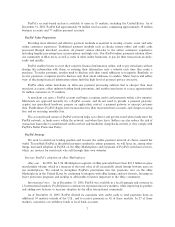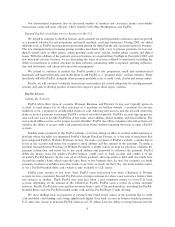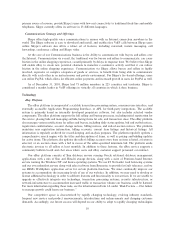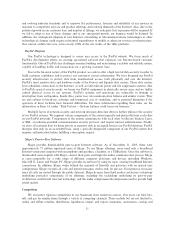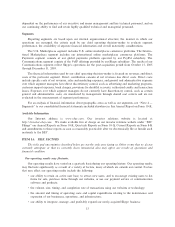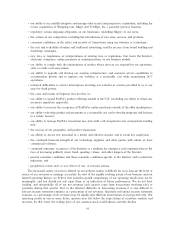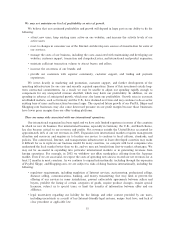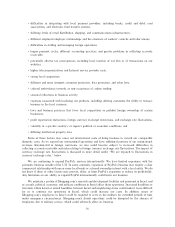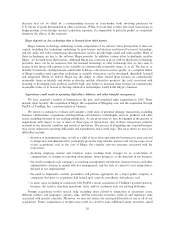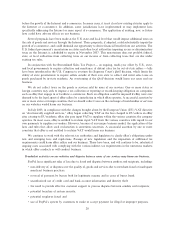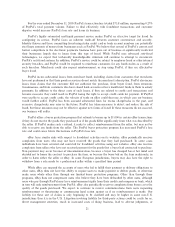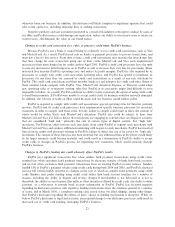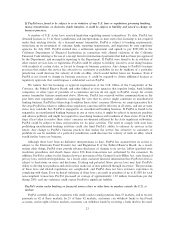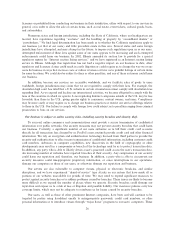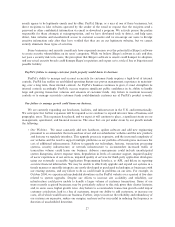eBay 2005 Annual Report Download - page 21
Download and view the complete annual report
Please find page 21 of the 2005 eBay annual report below. You can navigate through the pages in the report by either clicking on the pages listed below, or by using the keyword search tool below to find specific information within the annual report.Our operations in China are subject to risks and uncertainties relating to the laws and regulations of the
People's Republic of China.
Our operations in the People's Republic of China, or PRC, are conducted through our EachNet
subsidiary and through a PayPal subsidiary. EachNet and PayPal are Delaware corporations and foreign
persons under the laws of the PRC and are subject to many of the risks of doing business internationally
described above in ""There are many risks associated with our international operations.'' The PRC currently
regulates its Internet sector through regulations restricting the scope of foreign investment and through the
enforcement of content restrictions on the Internet. While many aspects of these regulations remain unclear,
they purport to limit and require licensing of various aspects of the provision of Internet information services.
These regulations have created substantial uncertainties regarding the legality of foreign investments in PRC
Internet companies, including EachNet and PayPal, and the business operations of such companies. In order
to meet local ownership and regulatory licensing requirements, the eBay EachNet website is operated through
a foreign-owned enterprise indirectly owned by eBay's European operating entity, which acts in cooperation
with a local PRC company owned by certain local employees. The PayPal China website is operated through a
foreign-owned enterprise owned by PayPal's International headquarters entity, which acts in cooperation with
a local PRC company owned by certain local employees. We believe EachNet's and PayPal's current
ownership structures comply with all existing PRC laws, rules, and regulations. There are, however,
substantial uncertainties regarding the interpretation of current PRC laws and regulations, and it is possible
that the PRC government will ultimately take a view contrary to ours. The People's Bank of China, or PBOC,
has recently proposed guidelines for payment settlement organizations which, if enacted and applied to
PayPal's operations in China, could have a material adverse effect on those operations, including, but not
limited to, requiring PayPal to act in cooperation with a different local PRC entity and obtain approval from
the PBOC. There are also uncertainties regarding EachNet's and PayPal's ability to enforce contractual
relationships they have entered into with respect to management and control of the company's business. If
EachNet or PayPal were found to be in violation of any existing or future PRC laws or regulations, it could be
subject to fines and other financial penalties, have its business and Internet content provider licenses revoked,
or be forced to discontinue its business entirely. In addition, any finding of a violation by EachNet or PayPal of
PRC laws or regulations could make it more difficult for us to launch new or expanded services in the PRC.
Although Skype does not conduct operations in the PRC directly, it makes its product available through a
joint venture and its product is used by residents of the PRC. PRC regulations surrounding VoIP telephony
are unclear or non-existent, and the PRC or one of more of its provinces may adopt regulations that restrict or
prohibit the use of Skype's product.
We are exposed to fluctuations in currency exchange rates.
Because we conduct a significant and growing portion of our business outside the United States but report
our results in U.S. dollars, we face exposure to adverse movements in currency exchange rates. In connection
with its multi-currency service, PayPal fixes exchange rates twice per day, and may face financial exposure if it
incorrectly fixes the exchange rate or if exposure reports are delayed. PayPal also holds some corporate and
customer funds in non-U.S. currencies, and thus its financial results are affected by the translation of these
non-U.S. currencies into U.S. dollars. In addition, the results of operations of our internationally focused
websites are exposed to foreign exchange rate fluctuations as the financial results of the applicable subsidiaries
are translated from the local currency into U.S. dollars upon consolidation. If the U.S. dollar weakens against
foreign currencies, the translation of these foreign-currency-denominated transactions will result in increased
net revenues, operating expenses, and net income. Similarly, our net revenues, operating expenses, and net
income will decrease if the U.S. dollar strengthens against foreign currencies. The change in weighted average
foreign currency exchange rates in 2005 relative to 2004 resulted in higher net revenues of approximately
$12.0 million and an increase in aggregate cost of revenues and operating expenses of approximately
$5.6 million. As exchange rates vary, net sales and other operating results, when translated, may differ
materially from expectations. In particular, to the extent the U.S. dollar strengthens against the Euro and
British Pound, our European revenues and profits will be reduced as a result of these translation adjustments.
In addition, to the extent the U.S. dollar strengthens against the Euro and the British Pound, cross-border
trade related to purchases of dollar-denominated goods by non-U.S. purchasers may decrease, and that
17


